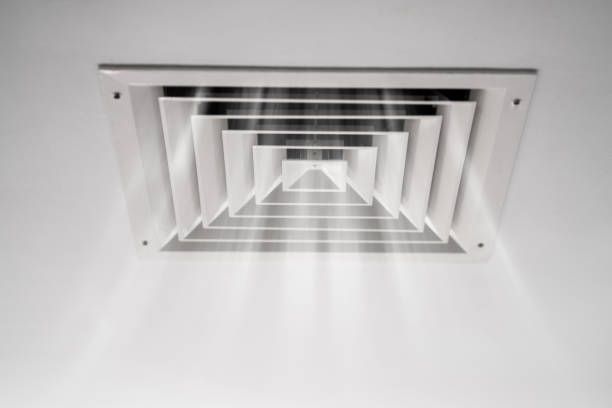HVAC stands for Heating, Ventilation, and Air Conditioning. It’s a critical system used to control the temperature, humidity, and air quality in enclosed spaces such as buildings, homes, and industrial units. It encompasses all the equipment responsible for maintaining a comfortable indoor environment. Let’s dive into the basics of HVAC (heating, ventilation, and air conditioning). Whether you’re a beginner or just looking to refresh your knowledge, understanding HVAC concepts is essential.
Table of Contents

Let’s break down the HVAC components and processes involved:
- Heating Process:
- Purpose: To warm a specific area or room.
- Components: Furnace, boiler, and heat pump.
- Methods: Conduction, convection, and radiation.
- Use: Essential in cold climates or areas where heat is crucial for survival or specific processes.
- Ventilation Process:
- Purpose: Maintain clean and steady airflow indoors and outdoors.
- Application: Car parking areas use ventilation to remove excess carbon dioxide emitted by vehicles, ensuring fresh air supply.
- Importance: Keeps the air fresh and pollution-free.
- Air Conditioning Process:
- Purpose: Cool a designated area or room.
- Components: Air conditioners, chillers, and cooling towers.
- Use: Vital in hot and humid climates or areas where cooling and humidity control are essential.
Purpose of HVAC Systems:
- Temperature Control: HVAC systems regulate indoor temperatures, ensuring comfort and productivity.
- Humidity Control: Proper humidity levels are crucial for comfort and health.
- Air Quality Control: HVAC systems filter and circulate fresh air, removing pollutants and maintaining good air quality.
Types of HVAC Systems:
- Split System: Common residential system with indoor and outdoor units.
- Hybrid Heat Pump: Combines electric heating and cooling.
- Ductless Mini-Split: Ideal for individual rooms without ductwork.
- Ducted Mini-Split: Centralized system with ducts.
- Packaged System: All components in a single unit.
Why HVAC Matters:
- HVAC systems not only provide comfort but also impact health and safety. For instance, extreme cold and heat can be life-threatening.
- Modern heat pumps replace traditional gas furnaces, making HVAC systems more versatile.
What are some common HVAC problems?
HVAC systems can encounter various issues. Here are some common HVAC problems and their potential solutions:
- Dirty or Clogged Filters:
- A dirty or clogged air filter restricts airflow, reducing system efficiency.
- Solution: Regularly replace or clean filters to maintain optimal performance.
- Malfunctioning Thermostat:
- A faulty thermostat can lead to temperature inconsistencies.
- Solution: Check thermostat settings, replace batteries, and ensure proper calibration.
- Blown Fuses and Tripped Circuit Breakers:
- Electrical issues can cause the AC unit to stop working.
- Solution: Check the circuit breaker and reset if necessary.
- Water Leaks:
- Leaking water from the AC unit can damage components.
- Solution: Inspect drain lines, condensate pan, and seals for leaks.
- Refrigerant Leaks:
- Low refrigerant levels affect cooling capacity.
- Solution: Detect and repair leaks, then recharge the system.
- Unusual Noises:
- Grinding, rattling, or squealing sounds indicate mechanical problems.
- Solution: Consult a professional to diagnose and fix the issue.
- Dirty Coils:
- Accumulated dirt on evaporator and condenser coils reduces efficiency.
- Solution: Regularly clean coils to improve heat exchange.
- Poor Airflow:
- Insufficient airflow leads to uneven cooling or heating.
- Solution: Check for blocked vents, clean ducts, and ensure proper fan operation.
Remember that regular maintenance and professional inspections can prevent many of these common HVAC problems.

Water damage in HVAC
Water damage in HVAC systems can be a significant issue, affecting efficiency and potentially causing unexpected breakdowns. Let’s explore common causes of water-related problems in HVAC units and how to address them:
- Improper Installation:
- Cause: Poor installation by contractors can lead to water leaks. Misaligned pipes or poorly designed drainage systems may result in water escaping from HVAC unit connections.
- Solution: Contractors should ensure all components fit securely during installation. Properly set up condensate pumps and drainage systems in the utility room.
- Overflow Pan Damage:
- Cause: The overflow pan collects condensation from evaporator coils. Over time, it can become damaged or corroded.
- Solution: Regularly inspect overflow pans for signs of wear and tear. Replace damaged pans promptly.
- Refrigerant Levels:
- Cause: Low refrigerant levels can lead to frozen coils and excess water production.
- Solution: Professionals should monitor refrigerant levels during routine maintenance and adjust as needed.
Immediate Actions for Identifying and Fixing Water Leaks:
- System Shutdown:
- Turn off the HVAC system immediately to prevent further damage.
- Assess any nearby water damage.
- Leak Inspection:
- Check visible pipes for signs of moisture or dripping.
- Place a bucket under the leak to catch drips and minimize flooding.
- Professional Help:
- Contact an HVAC repair company to fix the issue.
Regular maintenance and timely repairs are essential to prevent water damage in your HVAC system. If you notice any issues, seek professional assistance promptly!

How can I prevent water damage in my HVAC system?
Preventing water damage in your HVAC system is crucial for maintaining its efficiency and longevity. Here are some tips to help prevent water-related issues:
- Change the HVAC Filter Regularly:
- Why: A dirty or clogged filter can lead to system overworking, which may cause freezing and subsequent defrosting on the evaporator coils.
- How: Replace the filter at least once a month using high-efficiency particulate air (HEPA) filters.
- Inspect Overflow Pans:
- Why: Overflow pans collect condensation from evaporator coils. Damaged or corroded pans can cause significant water damage.
- How: Regularly check overflow pans in the utility room for signs of wear and tear. Promptly replace damaged pans.
- Monitor Refrigerant Levels:
- Why: Low refrigerant levels can lead to frozen coils and excess water production.
- How: During routine maintenance, professionals should monitor refrigerant levels and adjust as needed.
- Install a Condensation Pump:
- Why: A condensation pump helps excess water flow into a proper disposal drain.
- How: Consider adding a safety float switch that automatically turns off the HVAC unit’s power when condensation builds up, preventing overflow.
- Insulate All Components:
- Why: Proper insulation prevents condensation, which can cause water-related issues over time.
- How: Insulate pipes, coils, and ducts to minimize moisture buildup.
Remember, regular maintenance and timely repairs are essential for preventing water damage in your HVAC system. If you notice any issues, seek professional assistance promptly! 😊
For more interesting information about Property restoration Follow us on Instagram PuroClean of McLean & Alexandria (@puroclean.alx) • Instagram photos and videos\
For more Articles visit our Website Property Damage Restoration Services in Alexandria, VA (puroclean.com)
PuroClean on the Move!





 PuroClean of Alexandria
PuroClean of Alexandria